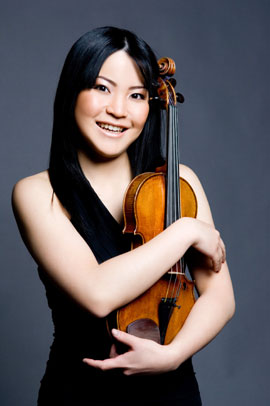Spivakov, virtuosic Russian orchestra bedazzle the Arsht Center audience

The final season of the Concert Association of Florida was, fittingly, framed by Russian orchestras: Valery Gergiev and the Mariinsky Orchestra last November and Vladimir Spivakov and the National Philharmonic of Russia Friday night at the Adrienne Arsht Center.
In between, the forty-year old presenting organization folded in February, but the Arsht Center stepped in and picked up responsibility for the remaining Concert Association events at its venue, for which it deserves an ovation by all local music fans. Even more heartening, in an interview with South Florida Classical Review on Friday, Arsht CEO John Richard said that the center would inaugurate a new classical series this fall, welcome news that Miami audiences will still get to hear great touring artists and orchestras.
Friday night’s performance by the National Philharmonic of Russia certainly made the case for such a series, with an enthusiastic—and remarkably well-behaved—audience of around 2,000 filling the Knight Concert Hall for a program of Russian warhorses.
There is a bewildering supply of Russian orchestras and, more often than not, they seem to be led by violinist-turned-conductor Spivakov. Yet the National Philharmonic is clearly among Russia’s finest, as well as its youngest, formed just six years ago. From top to bottom, the ensemble is comprised of virtuoso musicians who perform with wonderful character and enthusiasm, many players fairly jumping off their chairs with intensity. The opener, the Polonaise from Tchaikovsky’s opera Eugene Onegin, made a worthy calling card, for the orchestra’s rich, dark strings.
Initial disappointment that soloist Mayuko Kamio would perform the more populist Tchaikovsky Violin Concerto rather than the originally scheduled Sibelius, dissipated upon reading that the young Japanese violinist was the Gold Medal winner at the 2007 Tchaikovsky Competition.
 Kamio has technique to burn with a strong bow arm and virtually faultless musicianship. An individual interpretive profile was less evident Friday, though in the first movement, Kamio observed dynamic markings closely and played with precision and taste, if some rhythmic heaviness, her stately tempos in no way playing to the gallery.
Kamio has technique to burn with a strong bow arm and virtually faultless musicianship. An individual interpretive profile was less evident Friday, though in the first movement, Kamio observed dynamic markings closely and played with precision and taste, if some rhythmic heaviness, her stately tempos in no way playing to the gallery.
In the Canzonetta Kamio brought refined delicacy and half-tones to her solo passages, as well as daunting fire and bravura to the finale. The violinist’s very physical virtuosity sailed through the technical landmines with remarkable speed and accuracy, Spivakov and the orchestra providing attentive support.
On the second half, Spivakov showed he clearly has a close-knit relationship with his orchestra in Stravinsky’s Divertimento, The Fairy’s Kiss.
For a commission marking the 35th anniversary of Tchaikovsky’s death, Stravinsky mined several lesser known Tchaikovsky themes for this fantastical ballet. This hybrid confection retains the melodic charm of Tchaikovsky’s original material, but provides a sly injection of Stravinsky’s own acerbic qualities in the rhythmic curveballs, insistent dynamic contrasts and quirky woodwind writing.
This is difficult music to bring off, yet Spivakov and his players delivered the goods magnificently, conveying the wry wit of Stravinsky’s retooling as well as the warmth of Tchaikovsky’s melodies. The Russian players made this into a kind of off-kilter concerto for orchestra, the musicians shining collectively and individually with personality-plus oboe, clarinet, trumpet and cello solos.
Prokofiev’s Romeo and Juliet remains the most overprogrammed work in South Florida by visiting orchestras, but Spivakov and colleagues brought such freshness and idiomatic finesse to three familiar excerpts that it was hard to cavil.
Rather than the hyped-up volume of many (non-Russian) conductors, Spivakov brought out the ballet’s scoring ingenuity and refinement, with the central section of Montagues and Capulets having a dreamy languor to balance the malign march-like outer sections. So too, there was plenty of whirlwind velocity in the lightning string runs of The Death of Tybalt, but the massive murder chords were less bludgeoning than usual, and more steely and pointed, making for an even more chilling effect.
The enthusiastic ovations brought Spivakov back for a generous supply of encores: a darkly elegant rendering of Sibelius’ Valse triste, the Spanish Dance from Tchaikovsky’s Swan Lake (with a spectacular trumpet solo), a brightly Latinate Intermezzo from Gimenez’s zarzuela, La Boda de Luis Alonso, and rounding off an enjoyable evening with the frenzied Georgian Dance from Khachaturian’s Gayne ballet.
Posted in Performances
One Response to “Spivakov, virtuosic Russian orchestra bedazzle the Arsht Center audience”
Leave a Comment
Sat Apr 11, 2009
at 4:49 pm
1 Comment







Posted Jan 07, 2011 at 12:11 pm by Ukeme Bassey
Bravo to the violin goddess Mayuko Kamio. In the 2007 International Tchaikovsky Competition, Mayuko proved that she had a good grasp of her onions. The speed at which she played and the precision with which she picked the notes were evidence of hard work. I was particularly taken aback when I recalled that she came fifth at the Montreal International Musical Competition the previous year. Mayuko is a force to reckon with. We look forward to seeing her in the forthcoming 2011 International Tchaikovsky Competition.